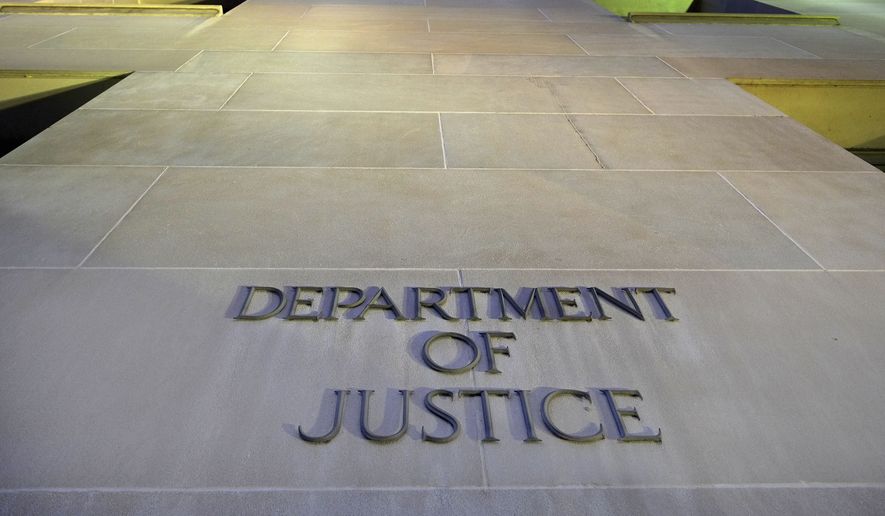The Justice Department is upgrading and modernizing rules for applying restrictions to foreign influence activities first covered under a Depression-era law.
The department disclosed the proposed rule changes in a notice Wednesday seeking public comment on several proposed changes to the way the 1938 Foreign Agents Registration Act (FARA) is implemented.
The act, last amended in 2007, is administered by the attorney general and requires those acting as agents of a foreign powers to register with the Justice Department. The registration includes disclosing the type of activities of the foreign agents as well as funding sources.
“The effective and efficient enforcement of FARA is critical to facilitate transparency about foreign influence efforts and to support our democracy,” said Assistant Attorney General Matthew G. Olsen, head of the Justice’s National Security Division.
Among the rule changes being considered are whether to increase the scope of agent activities and ending some exemptions under FARA for commercial agents, lawyers and foreign agents currently unrestricted when engaging in religious, scholastic or scientific pursuits.
The new rules also would modernize regulations on how agents who spread foreign government information are covered, including extending restrictions on online and digital material.
“Modernization of FARA’s implementing regulations will further facilitate the department’s focus on FARA enforcement to ensure transparency in U.S. democratic processes,” the notice said.
FARA currently defines foreign agents as people engaged in political activities intended to influence U.S. government officials or the American public regarding foreign or domestic policy on behalf of a foreign government or political party.
Covered under the law are people working for foreign governments and acting as public relations counsel, publicity agents, information service workers or political consultants. Additionally, foreign agents who must register include those who solicit, collect or disperse money or “things of value” within the United States on behalf of foreign governments.
Registrants also include those in the United States who represent the interests of foreign governments before U.S. government officials or agencies.
The new rules could require more reporting from the many organizations and consultants that receive funding or other support from the Chinese government, such as free travel to China. Chinese students who engage in anti-dissident protests and activities in the United States would be required to register as foreign agents under the proposed rules. Such activities currently are exempt under FARA.
Foreign agents who distribute information materials online also could be required to register under the proposed rules.
Also, advocacy groups that receive 30% to 50% of their funding from foreign governments must register. That requirement could be added to the new FARA rules.
A department spokesman had no comment beyond the notice.
The Justice Department is seeking comment on whether to amend guidance issued in 2020 on who should register under FARA to its formal regulations. That guidance states that an American businessman who was an honorary consul to a foreign nation who was fundraising for a memorial in that nation did not have to register.
Billy Carter, the younger brother of former President Jimmy Carter, was required to register as a foreign agent in 1980 after receiving a $200,000 loan from the Libyan government, the guidance said.
“Foreign governments routinely engage in efforts to influence our domestic and foreign policies, legislation, democratic processes, and public opinion,” a Justice Department’s FARA brochure states.
Such influence activities by lobbyists, public relations professionals, businesspeople, or former U.S. government officials are legal — so long as they are transparent.
Agents operating covertly for foreign governments can be prosecuted for failing to register.
According to the Justice Department website, one recent case of an illegal foreign agent involved former Republican fundraiser Elliott Broidy, who pleaded guilty in 2020 to one count of conspiracy to violate FARA.
“In exchange for millions of dollars, Broidy and his co-conspirators agreed to secretly do the bidding of foreign principals by lobbying senior U.S. government officials on pending matters at the Department of Justice,” the department stated. “Broidy admitted to his role in a covert campaign to influence the U.S. government on behalf of Chinese and Malaysian interests.”
Mr. Broidy took part in a covert lobby effort aimed at “the highest levels of the U.S. government” to force the deportation of a Chinese dissident to China and to halt the fraud prosecution of 1Malaysia Development Berhad (1MDB), among the largest fraud and money-laundering prosecutions in U.S. history.
As part of the campaign, Mr. Broidy tried to arrange meetings for a Chinese security official with the attorney general, the secretary of homeland security and other senior officials.
Another high-profile FARA case involved political consultant Paul Manafort, who in 2018 pleaded guilty to multiple crimes, including failing to register as a foreign agent for his work on behalf of the Ukrainian government.
Both Mr. Broidy and Mr. Manafort were pardoned in 2020 by President Trump.
• Bill Gertz can be reached at bgertz@washingtontimes.com.




Please read our comment policy before commenting.